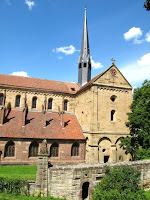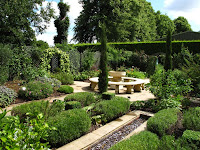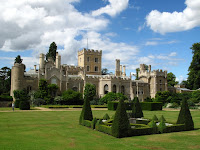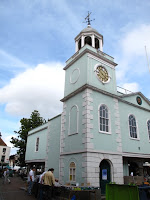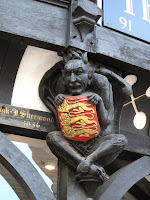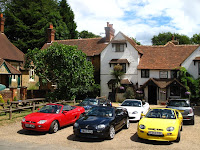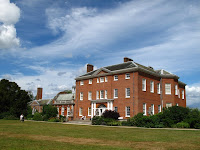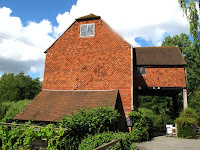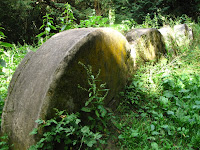 We had been well advised that the way to visit the Neuschwanstein Castle was to be at the ticket office when it opened at 8 a.m. and secure a place on the first English speaking tour. So, we were duly there at the head of the queue when the ticket office opened its doors and were able to secure places on the 9:20 tour.
We had been well advised that the way to visit the Neuschwanstein Castle was to be at the ticket office when it opened at 8 a.m. and secure a place on the first English speaking tour. So, we were duly there at the head of the queue when the ticket office opened its doors and were able to secure places on the 9:20 tour.We climbed the hill to the Castle and enjoyed the sun and views until our tour was announced.
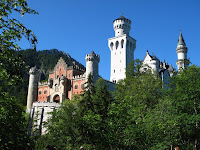 The castle, the inspiration for Disneyland's castle and featured in a number of films is the busiest tourist attraction in Germany so it is well worth making the effort to beat the crowds. When we got back down to the village it was overrun with tourists and the car park was practically full. (There are 4 other parks, but this one was the closest to the ticket office.)
The castle, the inspiration for Disneyland's castle and featured in a number of films is the busiest tourist attraction in Germany so it is well worth making the effort to beat the crowds. When we got back down to the village it was overrun with tourists and the car park was practically full. (There are 4 other parks, but this one was the closest to the ticket office.)Although looking like a mediaeval fairy tale castle,
 it was built in the late 1800s by King Ludwig of Bavaria who, tragically, only spent 176 days living there before his untimely and suspicious death. The castle was never finished, the third floor remains unfinished to this day and the castle was opened to the public a mere 6 weeks after Ludwig's death.
it was built in the late 1800s by King Ludwig of Bavaria who, tragically, only spent 176 days living there before his untimely and suspicious death. The castle was never finished, the third floor remains unfinished to this day and the castle was opened to the public a mere 6 weeks after Ludwig's death. It really is worth the hassle of procuring a ticket and climbing the track from the village (you can take horse-drawn transport if you are feeling particularly lethargic) as the interiors of the finished rooms are stunning.
It really is worth the hassle of procuring a ticket and climbing the track from the village (you can take horse-drawn transport if you are feeling particularly lethargic) as the interiors of the finished rooms are stunning.Leaving the castle we climbed up further to Marienbrucke
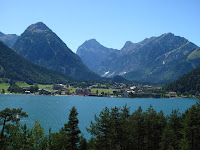 (Mary's Bridge) for a view of the other side of the castle with the valley beyond; we were terribly disappointed to find the entire side of the castle that was presented to us wrapped top to toe in scaffolding and plastic sheeting,
(Mary's Bridge) for a view of the other side of the castle with the valley beyond; we were terribly disappointed to find the entire side of the castle that was presented to us wrapped top to toe in scaffolding and plastic sheeting,But the Alps were beckoning so we set off from Fussen across the border into Austria to Lermoos then back in to Germany through
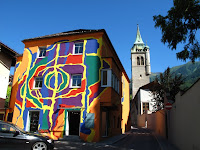 Garmisch-Partenkirchen and on to Wallgau. Wallgau is terribly attractive with the murals on the shops, hotels and restaurants that are built in the traditional Bavarian/Swiss/Austrian/alpine style.
Garmisch-Partenkirchen and on to Wallgau. Wallgau is terribly attractive with the murals on the shops, hotels and restaurants that are built in the traditional Bavarian/Swiss/Austrian/alpine style.After a bit of border hopping from Germany to Austria to Germany and back to Austria in a few short miles we were quite glad that EU travel rules were in place and all the border posts were abandoned and closed.
 We drove down the side of Achensee were we found a coffee shop to take a break; looking out over the lake and the Alps beyond. On to Schwaz where we stopped for a wander around before taking the scenic route over the hill to Matrei am Brenner and our lovely hotel for the night.
We drove down the side of Achensee were we found a coffee shop to take a break; looking out over the lake and the Alps beyond. On to Schwaz where we stopped for a wander around before taking the scenic route over the hill to Matrei am Brenner and our lovely hotel for the night.


